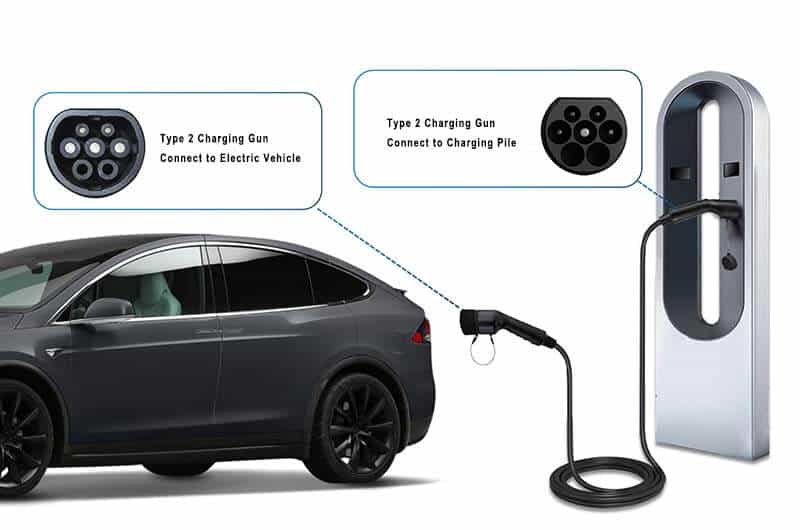A proper EV charging cable is one of the most important pieces for your electric vehicle. An EV cable is an important tool to help keep you moving, and depending on the type of EV charging station, you should keep one with you.
With a wide variety of EV charging cables available on the market, many EV owners are confused by the prospect of choosing the right charging cable for their EV.
Most electric vehicles come with at least one charging cable. But if you’re seeking for a new EV cable, or you just want to better understand EV charging cables and how they work, we’ve got you covered with everything you need to know in this quite complete guide.
What is an EV Charger Cable?
EV charging cables are connectors used to electric vehicles. An EV cable consists of three parts – a plug that connects to the EV charger’s power source, a length of wire, and a connector that plugs into the vehicle.
There are many different types of EV charging cables. The charging cable required for your EV will depend on the type of charger used and the vehicle inlet.
Here’s the details of the different types of AC EV charging cables and the types of vehicles they’re suitable for:
1. 3-Pin charging cable
A 3-pin charging cable is also considered a Mode 1 or Portable EV charging cable. These EV cables are a very basic form of EV charging, and they are often used as a backup power source. There are two types of 3-Pin charging cables available, including 3-Pin to Type 1 cables and 3-Pin to Type 2 cables. The type of EV you need will depend on the vehicle inlet.
All the 3-pin charging cables charge your EV much more slowly than other types of cables that connect to EV charging units, such as Type 1 and Type 2. The 3-pin cable is similar to a normal 3-pin plug and is used to power standard appliances like refrigerators and freezers. They can be connected to a household plug to charge your electric car.
The 3-pin chargers cable typically provide 3kW AC charging power, which is estimated to achieve a charging range of about 8 miles per hour. If you have an electric charging vehicle, it is recommended that you purchase a home EV charger for faster and more cost-effective charging.
2. Type 1 EV charging cable
Type 1 charging cables have 5 pins and they are single phase. These cables provide fast charging for compatible electric vehicles, providing approximately 3kW – 7kW of AC power. This provides a charging range of about 12-25 miles per hour. Type 1 charging cables are more popular in Asia and North America. If your vehicle requires a Type 1 charger, it may be useful to invest in a Type 1 to Type 2 charging cable to make it easier to power your vehicle in Europe.
3. Type 2 Electric Vehicle charging cable
Type 2 EV charging cables are the standard EV charging plug type throughout Europe and the UK. These cables feature a 7-pin design and offer fast charging rates of 3kW-7kW AC (single phase) or even 11kW and 22kW (three phase) for faster charging. Type 2 EV cables typically provide about 25 miles per hour on a charge.
Type 2 connectors can also provide direct current (DC), in which case the charging station is much faster. These DC Type 2 connectors are primarily reserved for Tesla Supercharger vehicles – they provide up to 250kW of power output and a mile radius of about 375 miles per half-hour charge.
The Type 2 EV charging cable connector has a locking mechanism to provide users with increased safety and reliability.
What to Consider When Buying an EV Charging Cable?
To determine the type of EV cable you need for your vehicle, you should determine the following factors:
Is your electric car Type 1 or Type 2 – Look at your EV socket to see if it requires a Type 1 or Type 2 plug. You should also be able to find this information in your charging car’s user manual.
Choose the right cable length – EV charging cables are usually between 4-10 meters in length. A charging cable of length 5 meters is generally recommended. You need to make sure that the length you choose is suitable for the distance from the EV charger to your vehicle. You should also keep in mind that you must have the right storage space for the cable length you choose.
Choose an appropriate current rating – it is important that your EV cables carry enough current to provide efficient charging. EV charging cables typically come in 16 and 32 amps, with the latter option being heavier and thicker in appearance because it carries more current. 3.5kW EV chargers typically have a 16-amp current supply, while 7kW EV charging wallboxes tend to have a 32-amp power supply.
To future-proof your EV cable, you can choose to purchase a 32-amp cable in case you choose to upgrade your EV in the future.EV

FAQ
What is the difference between Type 1 and Type 2 charging cables?
There are quite a few differences between Type 1 and Type 2 EV charging cables. You must understand these differences to ensure that you are purchasing the right option for your electric vehicle. Here is the key differences between Type 1 and Type 2 EV charging cables:
Type 2 charging cables are the standard electric vehicle charging method used in Europe. You’ll usually see these at public charging stations across the UK. Meanwhile, Type 1 chargers are an older charging method that is more common in Asia, Japan and the US.
Type 1 EV cables have 5 pins and a latch to help hold the plug in place and prevent it from falling out of the socket. Type 2 EV charging cables are designed with 7 prongs, instead of latches, they are equipped with a locking pin that locates and holds the plug in place. The fact that Type 1 EV cables do not have locking pins means that anyone could unplug the charging cable from the vehicle – so Type 2 EV cables are generally considered safer.
Type 1 charging cables are single-phase, while Type 2 cables can accommodate single-phase and three-phase power connections.
The Type 2 cable is equipped with resistors designed to communicate with the EV and let it know the cable is plugged in – so it can continue to charge. It also has other resistive functions designed to maintain power and detect the strength of the cable to ensure the right amount of power is delivered. In contrast, Type 1 cables have resistors that can simply detect if the EV cable is plugged into the car, and if the lever is pressed to unlock the plug, they will also turn off the charger.
We offer a range of EV chargers and EV charging cables. This includes a selection of Type 2 to Type 2 cables and Type 1 to Type 2 EV cables to help you charge your EV efficiently.
What are single phase and three phase meaning?
Understanding the concepts of single-phase and three-phase charging is another important part of being an EV owner.
Single-phase AC is used to charge standard electrical outlets in our houses, as well as to facilitate 3-Pin EV charging. This power flows through a conductor and can support up to 7.4 kW of home charging units.
Three-phase power cables are more powerful than single-phase ones because they have two extra wires – L2 and L3. Three-phase connectors are commonly used in commercial buildings and electric vehicle fast charging because they charge EVs three times faster than single-phase cables.
Some new charging cables are designed to accommodate single-phase and three-phase charging with automatic switching. This allows users to use three-phase charging cables on single-phase cars and charging points.
What are AC and DC?
Alternating current (AC) and direct current (DC) are the types of current used in electric vehicle charging.
Alternating current can be described as a current that changes direction regularly. Instead, direct current always flows in one direction.
Electric vehicle batteries require direct current to charge. However, regular electrical outlets and standard charging systems only provide AC power. Therefore, the built-in charger of an electric vehicle will convert the alternating current to direct current. Fast-charging EV systems are designed to provide DC power directly to the car battery, omitting the conversion process and providing faster charging speeds.
What size of EV charging cable should I buy?
If you are looking for a new EV charging cable for your car charger, Kelylands has an excellent solution for you. Our professional consultants can give you all the help and advice you need to find the right EV charging cable for your EV.
We manufacture and supply a range of EV charging cables, including Type 1 and Type 2 EV charging cables, as well as a variety of other EV chargers and charging accessories. Our product range also includes commercial and home EV chargers.
Start Your EV Charging Business With Kelylands Today!
Check out Kelylands AC EV charging range or contact us to discuss your needs further.

